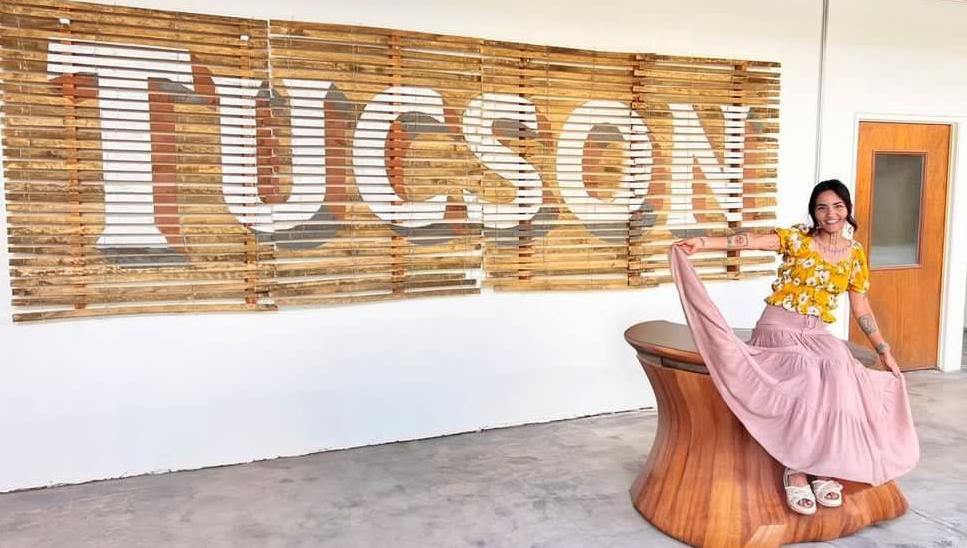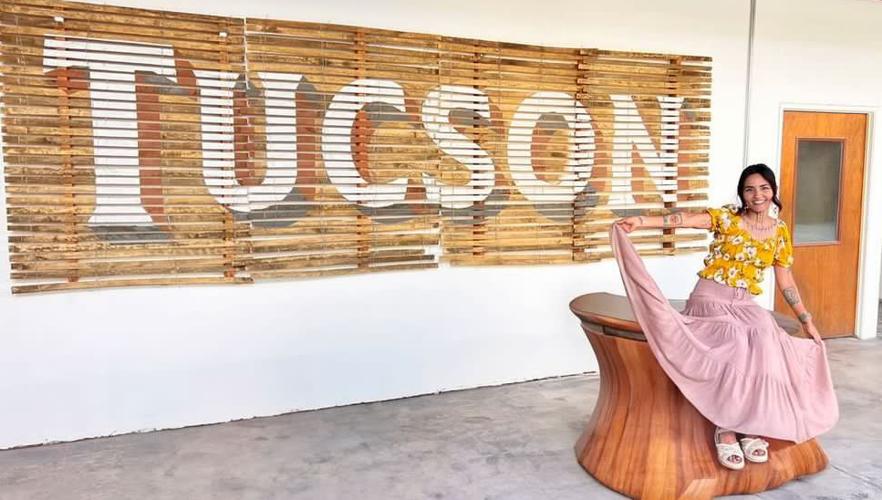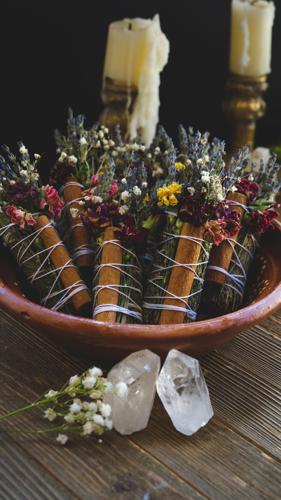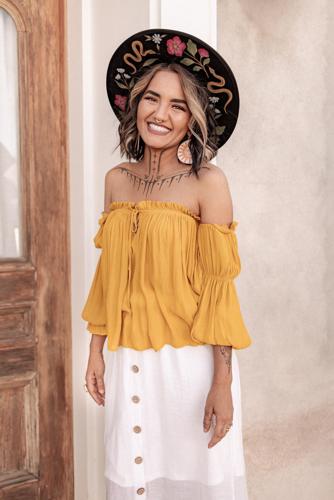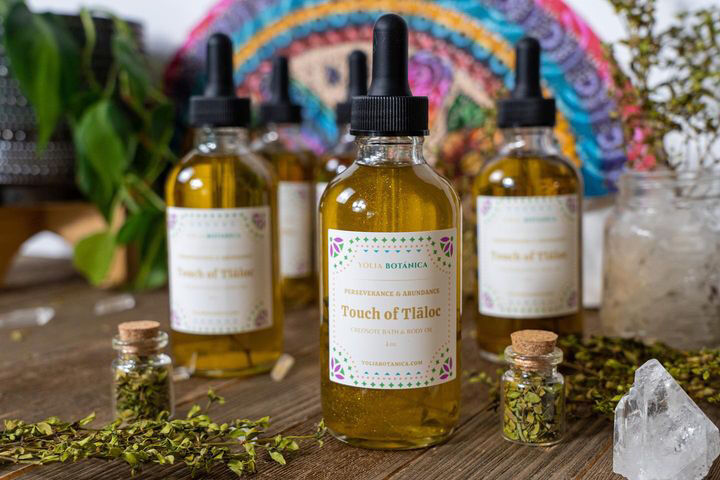Content warning: This story mentions difficult topics like suicide. The National Suicide and Crisis Lifeline is available 24/7 at 988.
Creosote, the beloved desert plant, can survive up to two years without water because of its robust root system.
Much like plants, people also use their root systems to endure life’s challenges. But sometimes finding and embracing those roots is a journey of its own.
The owner of local metaphysical shop Yōlia Botánica, Guadalupe “Lulu” Tineo, has been on that journey for the last several years, all of which led her to her latest venture — opening a brick-and-mortar.
People are also reading…
Yōlia Botánica officially opens its doors at 11 a.m. on Saturday, July 22 at 2210 S. Sixth Ave. #8.
The shop will feature some of Tineo’s handcrafted items like floral bundles, creosote bath and body oils, multi-purpose home and energy cleaners and cleansing mists, plus crystal tools and gemstone jewelry.
Tineo started delving into the world of spiritual and energetic healing around five years ago after a series of hardships.
“It's transformed a lot. It started off as one thing and then it just evolved into me finding my purpose and finding a meaning and a sense of belonging in a community that has felt the same way that I have,” she said.
“So many people don't find their footing, so many people don't know where their roots are because all their life, they were denied of their identity and they were shamed and pointed out for their identity. And it has given me so much peace, it's given me so much love, compassion and empathy for people, for myself, for everything I've went through. And I just don't see it any other way — everything led me here.”
When life hands you zucchini, make calabacitas
Tineo is from Sonora, Mexico and moved to Tucson when she was 9 years old. From the very beginning of her arrival to the United States, she faced adversity and what felt like the diminishment of her identity.
“I don't want to call it trauma. But in a way it was for me, out of all three siblings — I have an older sister and a younger brother — I think I took it the hardest,” she said. “The transition was really hard and I was bullied at school. … They used to call me a ‘wetback’ in school and I got bullied for not speaking English and for just looking different, for being different. And that was a really, really rough time.”

Guadalupe "Lulu" Tineo, 29, is the owner of Yōlia Botánica in Tucson.
Around 10 years ago, she applied for the Deferred Action for Childhood Arrivals (DACA) permit, which cost hundreds of dollars, but she never received it. There was a mistake in the application causing her permit to be delivered to the wrong address.
Despite fighting for six months to get a new permit, it was a lost cause.
Even when she married her husband, who is a U.S. citizen, and had U.S.-born children, Tineo still struggled to prove that she was enough, she recalled. She continued to fight for her permanent residence permit for five years until she finally had enough in 2018.
“I was on the verge of just losing all hope,” she said. “I remember I sent in my application and I got denied. In September (2018), I was sent a letter saying that I was denied and there was no explanation, nothing. I was so crushed — so, so crushed. I didn't understand how someone with a clean record, with a life to give, with a child, all these things that you'd look for, for somebody that can be the image of your American dream, (can be denied). It was me, I had it all. I had never hurt anyone. I had always wanted to be part of our society and contribute to our community. And I couldn't.”
2018 was a rough year for Tineo.
Before she was denied permanent residency in September, she experienced what she referred to as a mental breakdown after constantly feeling defeated and living with postpartum depression.
That summer, she attempted suicide.
“I just snapped. I remember I was so tired. I was so sleep-deprived. I felt so alone,” she said. “What was my purpose? Why was I even here?”
Her sister helped save her life by calling for help, which led to Tineo being taken into a crisis unit. But because of her undocumented status, she wasn’t able to receive the help she needed.
“They told me, ‘We can either enter you into the system and you'll have to go through all the legal sides of it, which puts you at risk of we don't know what or we can just pretend you never came,’” she said. “So I walked out of there with so much shame.”
But 2018 was also the turning point for Tineo, who told herself that she couldn’t continue to define herself by a piece of paper. (She ultimately received legal resident status in December 2018.)
By October of that year, she started her own business selling crystals, gemstones and herbal remedies that could help cleanse the soul. Initially known as Herbonyx, she later renamed her business Yōlia Botánica.

Pictured are floral bundles created by Lulu Tineo for Yōlia Botánica.
“There was a lot of internal turmoil from not being able to do anything or not being able to have aspirations for myself,” she said. “And it makes me emotional when I talk about it because this is why this is such a big deal for me. Because for the first time in my life, I dared to dream. And as small as it may be, as humble as it may be, it's the biggest thing I've ever done outside of (having) my kids.
“I'm so proud of everything that has come before me to teach me that this is where I'm meant to be. And that no matter how many things were thrown at me to tell me that I didn't belong and that I didn't deserve it or that I wasn't worthy of it, I am. And I have always been, it was just difficult back then.”
Raíces y Curanderismo
When Tineo opens Yōlia Botánica’s brick-and-mortar shop this month, she hopes to help locals connect with their roots and culture by providing the tools and space they need to heal their inner selves — no matter their background.
“That's my goal ... to create this space for people who have lost their roots, who have lost that sense of belonging with their culture because it was taken from them, because it was taken from their families and from their families before them,” she said. “And so it's just this generational robbery of identity and culture that we've gone through as descendants of Indigenous people. We've lost so much of that. And so we're sicker than ever, sadder than ever, with a lot of internal turmoil. And some of us have just needed a sense of belonging all along. That's all we've needed.”
Tineo is currently a curandera student, which means she's learning and practicing the traditional Mexican folk healing arts known as curanderismo. She described curanderismo as a mixture of African shamanism, Western medicine from Spain and Indigenous plant knowledge.
Because she utilizes curandero, all of her products are ethically sourced. She also doesn’t purchase or sell white sage (or palo santo) bundles because she's against the illegal poaching on Indigenous lands in California.
Multiple news organizations, including the Los Angeles Times, Arizona Republic and High Country News have reported on white sage poaching in recent years.

Some of the floral bundles that Yōlia Botánica sells. The bundles can be used for energy cleansings and other limpias.
“They (poachers) go take it to their shipping department or wherever and they send it to China. And China is doing all these things with it and then selling it back to you,” she said. “Urban Outfitters, Walmart, Spencer’s, the new-age witch shop down the street is selling it for $4. Those $4 don't belong to them. It was illegally poached to begin with.
“And how can you ensure white sage is ethical? You can't, there's no regulation for it. And this is something Indigenous people in California are trying so hard to fight — that there should be a regulation for it at the level of poaching that is happening or else it's going to go extinct. And now we're harming communities directly because we are all partaking in that, because we're ignorantly buying things that we know nothing about.”
Instead of using white sage, Tineo uses creosote, cedar, cinnamon and other floral elements to make her cleansing bundles.
‘I allowed myself to dream once and now there's no stopping me.’
After learning about the many challenges Tineo faced throughout her life, it wasn’t surprising to hear that another obstacle was the deciding factor in her decision to make the leap from an online shop and pop-up vendor to a brick-and-mortar.
In April of this year, she was involved in a collision on Interstate 10 when someone crashed into her car causing her to lose control and swerve across multiple lanes during rush hour traffic.
She ended up swerving off the freeway onto the frontage road, put her car in park and screamed into the steering wheel. She called the incident the worst feeling she’s ever experienced.
The crash that could have killed her happened after months of feeling burnout from participating in back-to-back local markets where she felt like she didn’t belong or was “overwhelmingly disappointed” with the amount of work she put in and what she received in return.
She took it as a sign that it was time for something new.
When she found the perfect location for a shop on Sixth Avenue, she said she had $3,000 in the bank and a “bucket of dreams.”
But where there were gaps to be filled, the community stepped up to fill them.
Tineo was able to move into the space thanks to a list of 11 local sponsors, including Espresso-Self Tucson, Tucson Tea Company, N1 Electric and Sobee's Tucson Cleaning, who agreed to help out.

Some of the creosote bath and body oils available at Yōlia Botánica.
“I allowed myself to dream once and now there's no stopping me,” she said. “And now I'm just like, ‘Keep dreaming girl, just keep dreaming.’ I would love to see myself outgrow this space in the next year or so and move somewhere with the ability to integrate more hands-on full healing practices. ... But my goal is to be able to provide different kinds of limpias or cleanses that aren't just like cleaning your house. Like I'm pulling the dirty clothes out of your soul. And I think in a bigger space, we will be able to do that. I will be able to do that.”
For Tineo, finding your roots, embracing your differences and enriching your soul (also known as yoli in the ancient Aztec language Nahuatl) is everything.
Because with a strong root system, you can survive anything.
“This is an extension of me,” she said. “It's an extension of my journey. I've worked very hard and struggled with the feeling of unfairness all my life. And for the first time ever, I finally feel like I made justice for everything I couldn't do. And all the dreams I couldn't have with this store.”
For more information about Yōlia Botánica, visit her Instagram page.



